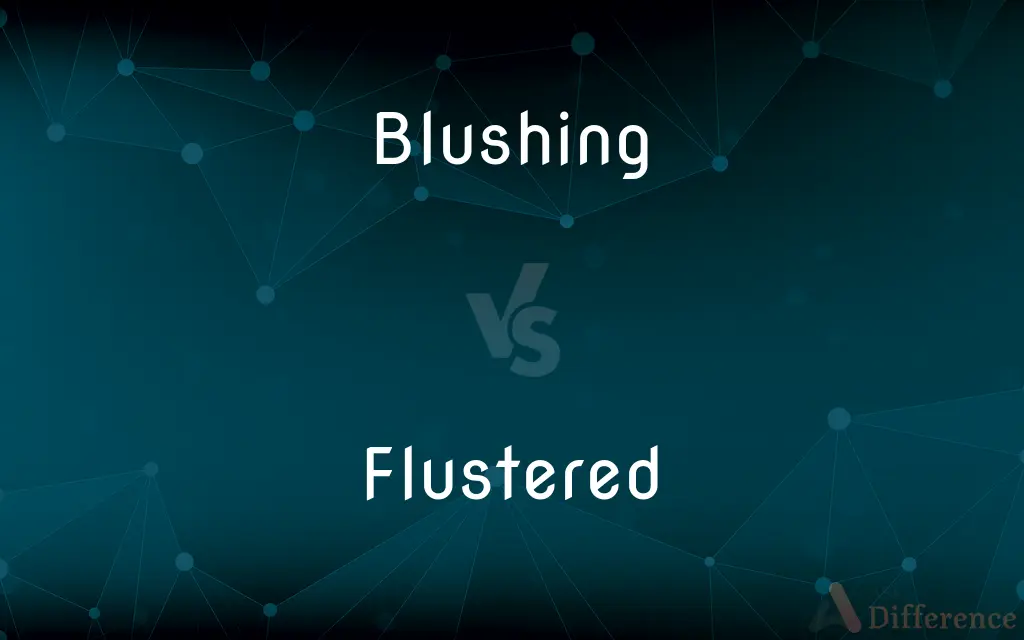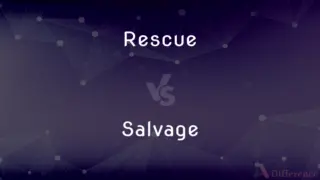Blushing vs. Flustered — What's the Difference?
By Tayyaba Rehman — Updated on December 25, 2023
Blushing is the reddening of a person's face due to emotional reasons, while being flustered refers to a state of agitation, confusion, or nervousness.

Difference Between Blushing and Flustered
Table of Contents
ADVERTISEMENT
Key Differences
Blushing is a physiological response where the face, neck, or chest turns red due to emotions like embarrassment, shyness, or romantic attraction. Flustered, however, describes a psychological state characterized by confusion, nervousness, or agitation, often resulting from embarrassment or pressure.
Blushing typically occurs involuntarily and is often associated with feelings of modesty or self-consciousness. Being flustered, on the other hand, can manifest in behaviors like stammering, forgetfulness, or disorganization, often due to being put on the spot or feeling overwhelmed.
While blushing is primarily a physical expression visible on the skin, being flustered encompasses a broader range of emotional and behavioral responses. A person who is flustered may also blush, but the two can occur independently.
The triggers for blushing often involve social interactions and personal feelings, such as receiving a compliment or being the center of attention. In contrast, becoming flustered can be triggered by a variety of situations, such as time pressures, unexpected challenges, or social faux pas.
Blushing is often perceived as a sign of innocence or sincerity, while being flustered can be seen as a lack of preparation or composure, though this varies greatly based on individual and cultural perceptions.
ADVERTISEMENT
Comparison Chart
Definition
Reddening of the face due to emotional reasons
State of agitation, confusion, or nervousness
Primary Manifestation
Physical (visible change in skin color)
Psychological (behavioral and emotional responses)
Common Triggers
Embarrassment, shyness, attraction
Overwhelm, pressure, unexpected situations
Voluntariness
Involuntary reaction
Can be a mix of involuntary and voluntary responses
Perception
Often seen as sign of modesty or sincerity
Sometimes viewed as lack of composure or preparation
Compare with Definitions
Blushing
Blushing is the reddening of the face due to emotional triggers.
She started blushing when her crush complimented her.
Flustered
Flustered refers to being in a state of agitated confusion.
He became flustered when he couldn't find his notes.
Blushing
Blushing can be a sign of romantic interest or attraction.
She noticed him blushing every time they talked.
Flustered
Flustered behaviors may include stammering or forgetfulness.
She was so flustered that she forgot her friend's name.
Blushing
Blushing can indicate feelings of embarrassment or shyness.
He was blushing during his speech, revealing his nervousness.
Flustered
Flustered can describe a lack of composure under pressure.
The unexpected question left the speaker flustered.
Blushing
Blushing often occurs in response to attention or praise.
Upon receiving the award, she was blushing with pride.
Flustered
Flustered can result from being overwhelmed or embarrassed.
He was flustered after spilling coffee in front of everyone.
Blushing
Blushing is a natural, involuntary physiological response.
Blushing betrayed her embarrassment at the mistake.
Flustered
Being flustered often involves nervousness or anxiety.
She felt flustered during the job interview.
Blushing
Blushing is the reddening of a person's face due to psychological reasons. It is normally involuntary and triggered by emotional stress associated with passion, embarrassment, shyness, fear, anger, or romantic stimulation.
Flustered
To make agitated, excited, or confused
Shouts from the protesters flustered the speaker. I was flustered by my teacher's comments and began to stumble over my words.
Blushing
To become red in the face, especially from modesty, embarrassment, or shame; flush.
Flustered
To become agitated, excited, or confused
A shy student who flusters easily.
Blushing
To become red or rosy.
Flustered
A state of agitation, excitement, or confusion
The heavy traffic put the driver in a fluster.
Blushing
To feel embarrassed or ashamed
Blushed at his own audacity.
Flustered
Confused, befuddled, in a state of panic by having become overwrought with confusion.
The speaker became quite flustered when she dropped all her notes.
Blushing
A reddening of the face, especially from modesty, embarrassment, or shame.
Flustered
Simple past tense and past participle of fluster
Blushing
A red or rosy color
The blush of dawn.
Flustered
Thrown into a state of agitated confusion; (`rattled' is an informal term)
Blushing
A glance, look, or view
Thought the painting genuine at first blush.
Blushing
Makeup used on the face and especially on the cheekbones to give a usually rosy tint. Also called blusher.
Blushing
Present participle of blush
Blushing
The act of one who blushes; a blush.
Blushing
Showing blushes; rosy red.
The blushing bride
Blushing
Showing blushes; rosy red; having a warm and delicate color like some roses and other flowers; blooming; ruddy; roseate.
The dappled pink and blushing rose.
Blushing
The act of turning red; the appearance of a reddish color or flush upon the cheeks.
Blushing
Having a red face from embarrassment or shame or agitation or emotional upset;
The blushing boy was brought before the Principal
Her blushful beau
Was red-faced with anger
Common Curiosities
What does it mean to be flustered?
Being flustered refers to a state of agitation, nervousness, or confusion, often due to pressure or embarrassment.
Are flustered people always nervous?
While nervousness is common, being flustered can also stem from being overwhelmed, confused, or agitated.
What causes blushing?
Blushing is caused by emotional triggers like embarrassment, shyness, or attraction leading to increased blood flow to the face.
Can someone blush without feeling embarrassed?
Yes, blushing can occur due to various emotions, not just embarrassment, like shyness or romantic attraction.
Can blushing be controlled?
Blushing is difficult to control as it is an automatic response of the body.
Is blushing a sign of honesty?
Some perceive blushing as a sign of sincerity or honesty, though it's not a reliable indicator.
What are common signs of being flustered?
Common signs include stammering, forgetfulness, and disorganization.
Is blushing a voluntary reaction?
No, blushing is an involuntary physiological response to emotional stimuli.
Does being flustered affect performance?
Yes, being flustered can impact performance by causing disorganization or lack of focus.
How can someone calm down when flustered?
Techniques like deep breathing, pausing, and focusing can help calm down when flustered.
Is blushing always related to negative emotions?
Not always, blushing can also be a response to positive emotions like happiness or affection.
Do all people blush the same way?
Blushing varies among individuals; some may blush more easily or intensely than others.
Can flustered feelings be prevented?
While not always preventable, preparation and mindfulness can help manage flustered feelings.
Are there long-term effects of being frequently flustered?
Frequent flustered states can lead to stress or anxiety if not managed effectively.
Can blushing occur without a clear emotional trigger?
Yes, blushing can sometimes occur without a clear emotional trigger, due to factors like physiological conditions.
Share Your Discovery

Previous Comparison
Iridocyclitis vs. Iritis
Next Comparison
Rescue vs. SalvageAuthor Spotlight
Written by
Tayyaba RehmanTayyaba Rehman is a distinguished writer, currently serving as a primary contributor to askdifference.com. As a researcher in semantics and etymology, Tayyaba's passion for the complexity of languages and their distinctions has found a perfect home on the platform. Tayyaba delves into the intricacies of language, distinguishing between commonly confused words and phrases, thereby providing clarity for readers worldwide.
















































